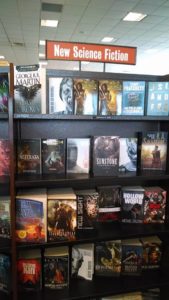I started my writing career with the glassy eyed hope of being traditionally published by a New York Publishing House. My books would be in book stores (this was a while ago, back when Borders was still in business and Barnes and Noble was going strong), people would line up out the door for my signings, I’d have options for movies and I’d get fan mail asking when my next book would be out. Or death threats for killing a character.
Well, it’s pretty hard to brea k into that world, which I found out the slow and painful way. I decided I would write a book with the purpose of getting it published. A year later it was “ready.” I queried every agent I’d ever met, and some I hadn’t. I did my research and sent my manuscript off to about forty agents and a couple of publishers that took open submissions. Then I waited.
k into that world, which I found out the slow and painful way. I decided I would write a book with the purpose of getting it published. A year later it was “ready.” I queried every agent I’d ever met, and some I hadn’t. I did my research and sent my manuscript off to about forty agents and a couple of publishers that took open submissions. Then I waited.
I knew it was a good story, but I didn’t realize that it wasn’t up to snuff for major publishing. After about six months of rejections, I was with my writing group and one of them had heard of a new press in our area. They were small, but after some quick research I felt that they would be innovative enough to keep up with the quickly changing publishing world. Almost on a whim, I submitted the first three chapters and a synopsis of my novel. And waited again.
A couple of months after that, I met this publisher at a conference. They were all really young, and I was a little afraid, but they remembered my story and asked for the rest of it. I obliged. A couple of weeks later, I had a publishing contract with them. I was on cloud nine!
Then, of course, reality set in. The original publishing date for my manuscript got pushed back not once, but twice. It only took me forty-five minutes to go through the “heavy editing” pass for my book. Trust me, it wasn’t that good. I never got a finalized copy edit from the publisher, and never received an e-copy of my book.
The biggest surprise was how much marketing they expected me to do. The only real direction I got was to be on as many social media platforms as possible and become the queen of them. Interact. Reach out. Be cool. Which isn’t terrible advice, but social media is not my forte. Which left me stressing about getting 30+ Tweets out a week and as many comments on other people’s stuff along with Facebook. And whatever else I could get involved in.
The only marketing my small press did for me was setting up book signings around my home, which was nice, and providing bookmarks and ARC copies of my book. After that, I was totally on my own. A rock tossed into a lake that had one trajectory—down.
I did see my book in Barnes and Noble (Sorry the picture is fuzzy, but my book is there), which was awesome. What wasn’t awesome was that they put it in the adult fantasy section. Right next to Brandon Sanderson. Hello, I write YA, not adult stuff. Brandon Sanderson readers would likely not dig my book. Which is fine, they’re not my audience. I talked to every B&N I went to and finally found out that the B&N hierarchy had somehow put my book into the category they thought it “Fit best” in. Uh, no. Nothing I did could change their minds. Which was frustrating.
Paralleling my experience with a small press, I had a friend who went Indie. She was building an audience and having a great deal of success as she figured out how to utilize Amazon to do her bidding.
One day I sat in a room full of authors doing book signings. Brandon Sanderson was in one corner, with his line out the door. Next to me sat a woman who had made six figures the year before Indie publishing. Not going to lie, I checked out her books and they weren’t that great, but they were in the “all the rage” category at the time. My brain went into action.
I had a long conversation with myself about what I really wanted. Did I want that line, or did I want to make money? Which you can do with a New York Press, but it’s very difficult with a small press. It’s not picnic with a large press either, especially since more and more of the marketing responsibility is being laid at the author’s feet. And without control over your categories and price point on-line it makes marketing more difficult.
After my book had basically tanked after two months, and my small press said they wouldn’t publish the second one unless I somehow sold a bunch of copies of the first, I decided to get out. I’d put a clause in my contract that they only had 60 days for their first rights of refusal. They went beyond that, and I got out. No fuss. No hard feelings. It just didn’t work out for me.
As I look back, I see that this small press wasn’t prepared for their own ambitious publishing schedule. Almost everyone there were interns (not actually paid) so you never knew if you were getting a good edit or even good advice. No one was trying to screw anyone else, but a company can only break so many promises before things go south.
Was it worth it to see my book in a bookstore? Yes. Would I do it again? Not sure. I needed that experience. It was my dream, and it came true. But like so many dreams, it wasn’t quite what I had pictured.







